牛津实用英语语法(无乱码)第23章
牛津实用英语语法 pdf

牛津实用英语语法pdf全文共四篇示例,供读者参考第一篇示例:牛津实用英语语法PDF是很多学习英语的学生必备的一本参考书,它详细地讲解了英语语法的各个方面,帮助学生更好地掌握英语语言规则,提高英语水平。
本文将从牛津实用英语语法PDF的结构、内容和优势等方面进行介绍,希望能为大家提供更多的了解和帮助。
一、牛津实用英语语法PDF的结构1. 词类和句子结构:介绍英语中的各种词类,如名词、动词、形容词、副词等,以及句子的基本结构,让学生了解英语的基本语法规则。
2. 时态和语态:详细讲解英语中的各种时态和语态,使学生能够准确地运用不同的时态和语态,表达自己的意思。
3. 主谓一致和关系从句:介绍主谓一致的规则和关系从句的用法,让学生在写作和口语交流中能够正确使用这些语法知识。
4. 修饰语和从句:讲解修饰语的种类和使用方法,以及从句的构成和用法,帮助学生丰富自己的语言表达方式。
5. 虚拟语气和倒装句:介绍虚拟语气和倒装句的用法,让学生了解这些比较复杂的语法结构,并能够正确运用。
6. 句子的连词和标点符号:教授不同种类的连词和标点符号的使用方法,使学生能够连贯地表达自己的想法,并避免语法错误。
牛津实用英语语法PDF以简洁清晰的方式介绍了英语语法的各个方面,旨在帮助学生快速地提高英语水平。
它不仅包含了基础的语法知识,还包括了一些高级的语法规则,适合各个级别的学生使用。
学生可根据自己的实际情况选择适合自己的部分进行学习,有针对性地提高自己的英语能力。
牛津实用英语语法PDF还提供了大量的例句和练习题,帮助学生巩固所学的知识,并检测自己的掌握程度。
通过反复练习,学生可以更快地掌握英语语法知识,进而应用到实际的语言交流中。
1. 结构清晰,内容丰富:牛津实用英语语法PDF的结构设计合理,内容详细全面,适合不同水平的学生使用,能够帮助他们系统地学习英语语法知识。
2. 实用性强,易于理解:牛津实用英语语法PDF注重讲解英语语法的实用性,通过简洁清晰的语言和大量的例句,帮助学生轻松理解并掌握英语语法规则。
新编英语语法教程 第23讲 练习参考答案
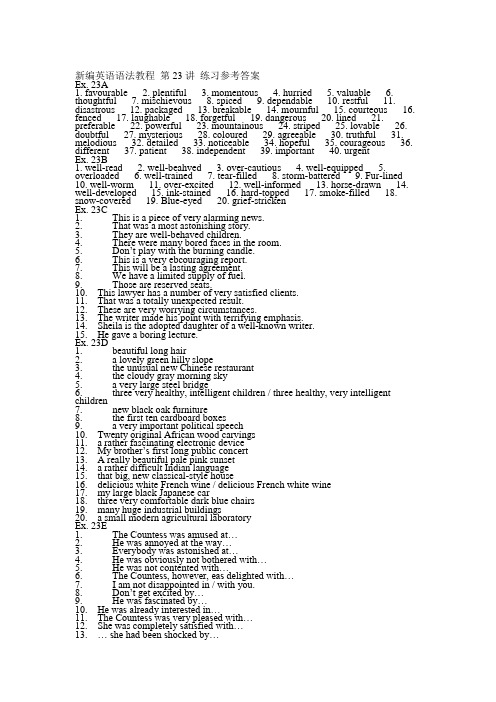
新编英语语法教程第23讲练习参考答案Ex. 23A1. favourable2. plentiful3. momentous4. hurried5. valuable6. thoughtful7. mischievous8. spiced9. dependable 10. restful 11. disastrous 12. packaged 13. breakable 14. mournful 15. courteous 16. fenced 17. laughable 18. forgetful 19. dangerous 20. lined 21. preferable 22. powerful 23. mountainous 24. striped 25. lovable 26. doubtful 27. mysterious 28. coloured 29. agreeable 30. truthful 31. melodious 32. detailed 33. noticeable 34. hopeful 35. courageous 36. different 37. patient 38. independent 39. important 40. urgentEx. 23B1. well-read2. well-beahved3. over-cautious4. well-equipped5. overloaded6. well-trained7. tear-filled8. storm-battered9. Fur-lined 10. well-worm 11. over-excited 12. well-informed 13. horse-drawn 14. well-developed 15. ink-stained 16. hard-topped 17. smoke-filled 18. snow-covered 19. Blue-eyed 20. grief-strickenEx. 23C1. This is a piece of very alarming news.2. That was a most astonishing story.3. They are well-behaved children.4. There were many bored faces in the room.5. Don’t play with the burning candle.6. This is a very ebcouraging report.7. This will be a lasting agreement.8. We have a limited supply of fuel.9. Those are reserved seats.10. This lawyer has a number of very satisfied clients.11. That was a totally unexpected result.12. These are very worrying circumstances.13. The writer made his point with terrifying emphasis.14. Sheila is the adopted daughter of a well-known writer.15. He gave a boring lecture.Ex. 23D1. beautiful long hair2. a lovely green hilly slope3. the unusual new Chinese restaurant4. the cloudy gray morning sky5. a very large steel bridge6. three very healthy, intelligent children / three healthy, very intelligent children7. new black oak furniture8. the first ten cardboard boxes9. a very important political speech10. Twenty original African wood carvings11. a rather fascinating electronic device12. My brother’s first long public concert13. A really beautiful pale pink sunset14. a rather difficult Indian language15. that big, new classical-style house16. delicious white French wine / delicious French white wine17. my large black Japanese car18. three very comfortable dark blue chairs19. many huge industrial buildings20. a small modern agricultural laboratoryEx. 23E1. The Countess was amused at…2. He was annoyed at the way…3. Everybody was astonished at…4. He was obviously not bothered with…5. He was not contented with…6. The Countess, however, eas delighted with…7. I am not disappointed in / with you.8. Don’t get excited by…9. He was fascinated by…10. He was already interested in…11. The Countess was very pleased with…12. She was compl etely satisfied with…13. … she had been shocked by…14. His old father would have been surprised at…15. Now, his father would not have been worried about…Ex. 23F1. We are adamant that you should resign.2. We are afraid that you have…3. I’m ashamed that you should have behaved…4. I an certain that there will be…5. We are concerned that you should feel…6. It is curious that you should say…7. We’re delighted that you see…8. It is essential that you should h ave…9. The Captain is furious that you (should have) revealed…10. We feel greatly honoured that you (should) have received us…11. Everyone is insistent that we should prolong…12. We are greatly relieved that we shall have…13. I’m not sure yet that I’ll be able to come…14. Is it true (that) you should said that?15. I’m surprised (that) you don’t know…。
2018牛津高中英语语法大全集(1至模块10语法)
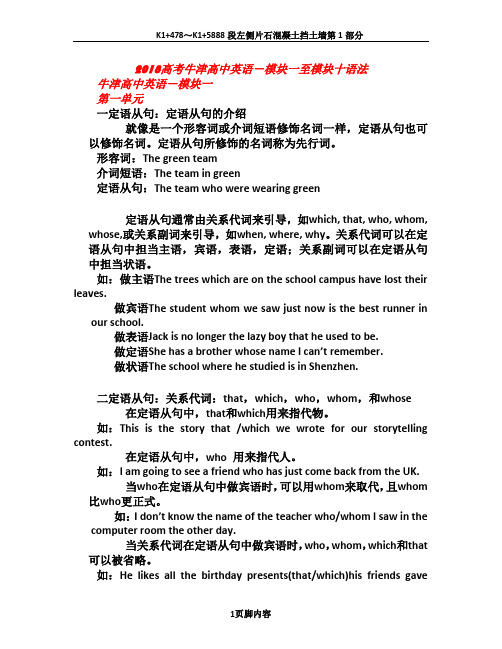
2018高考牛津高中英语-模块一至模块十语法牛津高中英语-模块一第一单元一定语从句:定语从句的介绍就像是一个形容词或介词短语修饰名词一样,定语从句也可以修饰名词。
定语从句所修饰的名词称为先行词。
形容词:The green team介词短语:The team in green定语从句:The team who were wearing green定语从句通常由关系代词来引导,如which, that, who, whom, whose,或关系副词来引导,如when, where, why。
关系代词可以在定语从句中担当主语,宾语,表语,定语;关系副词可以在定语从句中担当状语。
如:做主语The trees which are on the school campus have lost their leaves.做宾语The student whom we saw just now is the best runner in our school.做表语Jack is no longer the lazy boy that he used to be.做定语She has a brothe r whose name I can’t remember.做状语The school where he studied is in Shenzhen.二定语从句:关系代词:that,which,who,whom,和whose 在定语从句中,that和which用来指代物。
如:This is the story that /which we wrote for our storytelling contest.在定语从句中,who 用来指代人。
如:I am going to see a friend who has just come back from the UK.当who在定语从句中做宾语时,可以用whom来取代,且whom 比who更正式。
牛津实用英语语法 pdf

牛津实用英语语法pdf牛津英语语法学习:no such还是no such a一、such+a+单数可数名词大家知道,such 后接单数可数名词时,是必须要带不定冠词的,这样的例句词典上比比皆是。
如:Such a solution proved impractical. 这样一种解决方法证明是不切实际的。
I felt such a fool when I realized what I’d done. 当我明白自己干了什么时,感觉自己就像个傻瓜。
To be offered a place at such a good university is quite an achievement. 获得这样好的大学录取是件很了不起的事。
Such a large sorting operation can take up a lot of computer time. 如此复杂的排序操作会占用很多计算机时间。
Such a savage punishment is abhorrent to a civilized society. 这样残暴的惩罚在文明的社会引起反感。
There had never been such a beautiful woman anywhere in the world. 世界上从未有过如此美丽的女人。
Such a war could result in the use of chemical and biological weapons. 这样的战争可能导致使用生化武器。
二、no such+单数可数名词由于no 在意义上相当于not any, not a, not one等,所以当它后面修饰单数可数名词时不能再用不定冠词。
如:There’s no such thing as ghosts. 没有鬼神这类事。
(摘自《牛津英语搭配词典》)There is no such thing as a free lunch. 世上没有免费午餐之类的好事儿。
unit23 语法
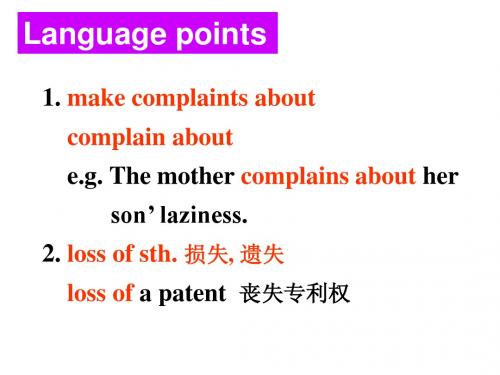
betray
• Betray sth./oneself 无意中泄露信息 • Betray …to… 出卖/ 泄露(国家、朋友) 给… • An act of betrayal 背叛行为 Eg. His voice betrayed the worry he was trying to hide.
End up
• end up意为“以...告终”;“最后处于 ;“最 意为“ 告终” 最后处于...”; 意为 告终 后成为” 后成为” How does the story end up? 后常接三种成分: • 1.后接名词(有时用with/as): He ended up as head of the company. 2.介词短语: You will end up in debt if you keep on spending money like that. • 3.分词(短语): We didn't like the performance, but we ended up cheering.
3. bid sth. /sb. goodbye (good morning) 向某事(某人 告别(问候 某人) 问候) 向某事 某人 告别 问候 e.g. Ten days later, they bade their home goodbye and headed for the city. 10天后 他们告别了家乡 动身前往城市。 天后,他们告别了家乡 天后 他们告别了家乡, 动身前往城市。 She bade me good morning when she met me yesterday. 昨天她遇到我时向我道了一声早安。 昨天她遇到我时向我道了一声早安。
小学牛津英语语法大全精心整理版
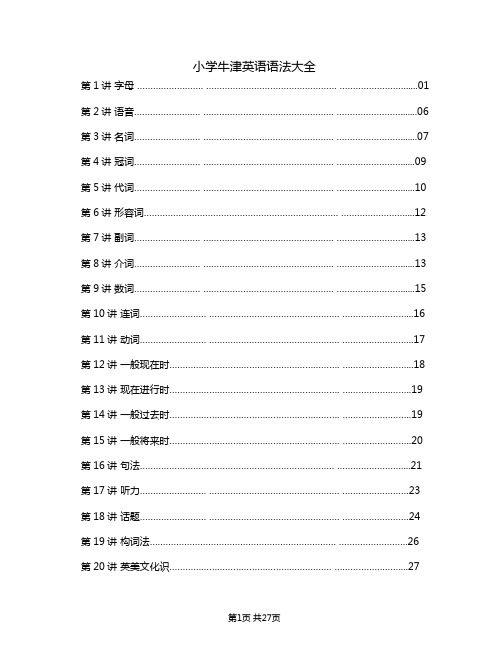
小学牛津英语语法大全第1讲字母......................... ................................................. (01)第2讲语音......................... ................................................. . (06)第3讲名词......................... ................................................. . (07)第4讲冠词......................... ................................................. (09)第5讲代词......................... ................................................. (10)第6讲形容词......................................................................... . (12)第7讲副词......................... ................................................. (13)第8讲介词......................... ................................................. (13)第9讲数词......................... ................................................. (15)第10讲连词......................... ................................................. (16)第11讲动词......................... ................................................. (17)第12讲一般现在时................................................................ (18)第13讲现在进行时................................................................ .. (19)第14讲一般过去时................................................................ .. (19)第15讲一般将来时................................................................ .. (20)第16讲句法......................................................................... . (21)第17讲听力......................... ................................................. . (23)第18讲话题......................... ................................................. . (24)第19讲构词法...................................................................... .. (26)第20讲英美文化识............................................................. . (27)第1讲字母1. 英语中共有26个字母。
《新编英语语法教程》(第6版)答案23
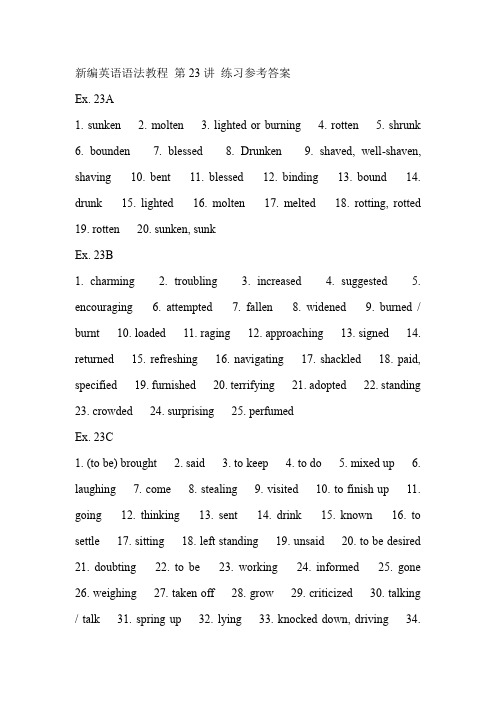
新编英语语法教程第23讲练习参考答案Ex. 23A1. sunken2. molten3. lighted or burning4. rotten5. shrunk6. bounden7. blessed8. Drunken9. shaved, well-shaven, shaving 10. bent 11. blessed 12. binding 13. bound 14. drunk 15. lighted 16. molten 17. melted 18. rotting, rotted 19. rotten 20. sunken, sunkEx. 23B1. charming2. troubling3. increased4. suggested5. encouraging6. attempted7. fallen8. widened9. burned / burnt 10. loaded 11. raging 12. approaching 13. signed 14. returned 15. refreshing 16. navigating 17. shackled 18. paid, specified 19. furnished 20. terrifying 21. adopted 22. standing 23. crowded 24. surprising 25. perfumedEx. 23C1. (to be) brought2. said3. to keep4. to do5. mixed up6. laughing7. come8. stealing9. visited 10. to finish up 11. going 12. thinking 13. sent 14. drink 15. known 16. to settle 17. sitting 18. left standing 19. unsaid 20. to be desired 21. doubting 22. to be 23. working 24. informed 25. gone 26. weighing 27. taken off 28. grow 29. criticized 30. talking / talk 31. spring up 32. lying 33. knocked down, driving 34.doing 35. crossed out 36. paid 37. said 38. shouting 39. understand 40. saidEx. 23D1. … Eurydice was bitten in the heel by a snake.2. … her foot was caught by a rug and she fell.3. … a notice pinned to the door by a knife.4. …‘Beware’written in large letters.5. … you should never point it at anyone.6. … you must take care not to damage the roots.7. … the dog was led out of the room.8. … After I have paid my taxes, …9. … the boat was being tossed up and down by the sea.10. … tree uprooted by the gale.11. … He was cleaning his gun when it went off unexpectedly.12. … As she was wondering where to go, …13. … I was knocked over by a bike.14. … I saw a long streamer towed behind the aeroplane, marked ‘V ote for Jones’.15. … Since he has been weakened by his last illness, …16. … I suddenly thought of an idea.17. When I was dropped by parachute, …18. When a woman is depressed, a new hat will make her feel happier.19. … he suddenly saw an old man starting to across in front of him.20. … I felt a taxi was a welcome sightEx. 23E1. Knowing that he was poor, I offered…2. Having barricaded the windows, we assembled…3. Becoming tired of my complaints, she turned off…4. Finding/ Having found no one at home, he left…5. Hoping to find the will, she searched…6. Having removed all traces of his crime, the criminal left…7. Realizing that he had missed the last train, he began…8. Exhausted by his work, he threw…9. Having spent all his money, he decided…10. Having escaped from prison, he looked…11. Having heard the story before, she didn’t want…12. Having found the treasure, they began…13. Entering the room suddenly, she found…14. Turning/ Having turned on the light, I was…15. Having visited the museum, we decided…16. Thinking we were lost, he offered…17. Having found his revolver and loaded it, he sat…18. Realizing/ Having realized that she couldn’t move it alone, she asked…19. Having fed the dog, he sat…20. Addressing the congregation, he said…21. … the characters, lying face downwards in a sea of mud, have an unintelligible conversation.22. Looking/ Having looked through the fashion magazines, I realize…23. The tree, uprooted by the gale, had fallen…24. People sleeping in the next room were…25. Knowing that the murderer was still at large, I was…26. Having been accommodated in an inn, he looked…27. Soaked to the skin, we reached…28. Sitting/ Seated in the front row and equipped with…, I saw…29. Knowing that the bull was bad-tempered, I didn’t like…30. Believing that she could trust him, she gave…31. Slates, ripped off by the gale, fell…32. The lion, finding his cage door open and seeing no sign of his keeper, left…33. The government, trying to tax people according to the size of their houses, put a tax…34. Having heard that the caves were dangerous, I didn’t like…35. Wearing extremely fashionable clothes and surrounded by photographers and pressmen, she swept…。
新概念英语第一册Lesson23-24笔记(语法点+配套练习+答案)

radio---radios
baby---babies
book---books
boy---boys
box---boxes
news--news
4.用"___"划出下列句中介词短语,并写明是定语还是表语.
The bookon the tableis Lily’s.(定语)
There are two apples. Do you wantone?
I have two pens, a redoneand a blueone.
These yellow coats are so small, I want those greenones.
五、单词练习,根据首字母填空
There are some apples onthe tree.
I like reading newspapers and magazines.
It’s too late, you should go to bed.
六、语法练习
1.用me,him,her,us或them填空。
Give Tim this shirt. Givehimthis one, too.
Give the children these ice creams. Givethemthese, too.
地板上的盒子a box on the floor
树下的孩子们children under the tree
教室里的老师a teacher in the classroom
湖里的鱼fish in the lake
4.对定语提问用which
The bookson the shelfare Sally's.对划线部分提问Which books are Sally’s ?
牛津初中英语各单元语法目录
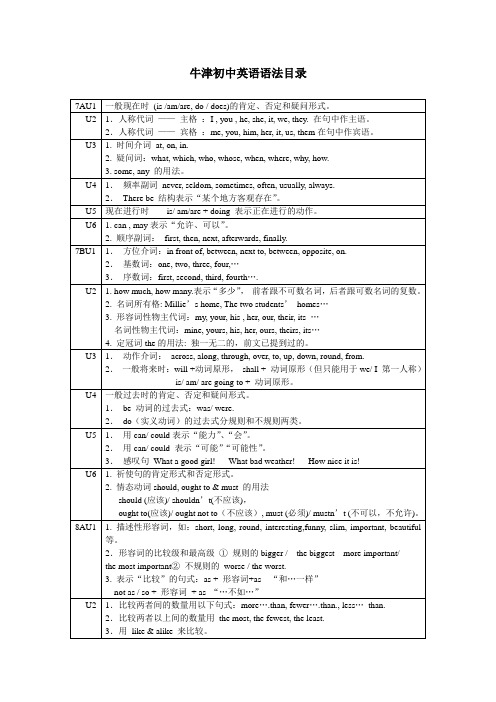
9AU1
1.句式:It is +形容词(性格)+of sb.+ (not) to do sth.
2.句式:主语+ be +形容词+enough + to do sth.
3.句子的不同成分:主语、谓语、表语、宾语、定语、状语。
3.形容词性物主代词:my, your, his , her, our, their, its…
名词性物主代词:mine, yours, his, her, ours, theirs, its…
4.定冠词the的用法:独一无二的,前文已提到过的。
U3
1.动作介词:across, along, through, over, to, up, down, round, from.
U2
1.过去进行时was / were + doing表示过去某个时刻正在进行的。
2.肯定、否定和疑问形式。
3. while和when在过去进行时中的用法。
U3
被动语态:
1.结构:be + done时态变化都只改变be的各种形式。
2.肯定、否定和疑问形式。
3.特殊动词没有被动形式。
4.主动形式表被动意义。
牛津初中英语语法目录
7AU1
一般现在时(is /am/are, do / does)的肯定、否定和疑问形式。
U2
1.人称代词——主格:I , you , he, she, it, we, they.在句中作主语。
2.人称代词——宾格:me, you, him, her, it, us, them在句中作宾语。
牛津英语语法要点精讲 朗文英语语法
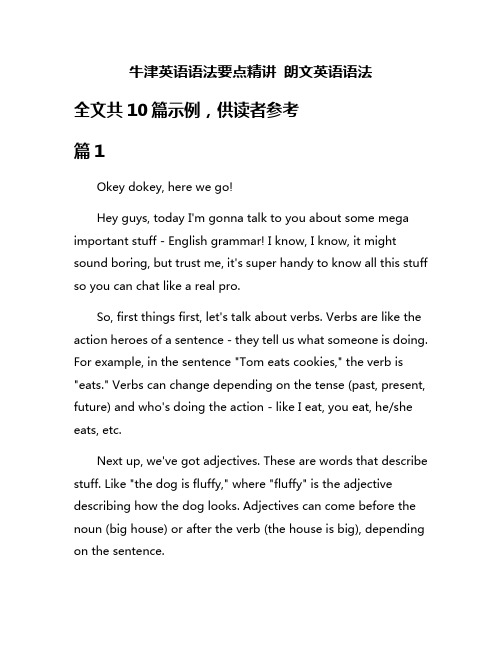
牛津英语语法要点精讲朗文英语语法全文共10篇示例,供读者参考篇1Okey dokey, here we go!Hey guys, today I'm gonna talk to you about some mega important stuff - English grammar! I know, I know, it might sound boring, but trust me, it's super handy to know all this stuff so you can chat like a real pro.So, first things first, let's talk about verbs. Verbs are like the action heroes of a sentence - they tell us what someone is doing. For example, in the sentence "Tom eats cookies," the verb is "eats." Verbs can change depending on the tense (past, present, future) and who's doing the action - like I eat, you eat, he/she eats, etc.Next up, we've got adjectives. These are words that describe stuff. Like "the dog is fluffy," where "fluffy" is the adjective describing how the dog looks. Adjectives can come before the noun (big house) or after the verb (the house is big), depending on the sentence.Now onto nouns. Nouns are names of people, places, things, or ideas. Like "cat," "London," "apple," or "freedom." Nouns can be singular (one cat) or plural (two cats). And don't forget about proper nouns, which are specific names like "Kate" or "New York."And let's not forget about pronouns! These handy little words replace nouns in a sentence. So instead of saying "Tom went to the park," you can say "He went to the park." Pronouns include words like I, you, he, she, it, we, and they.Lastly, let's chat about prepositions. These little words show the relationship between nouns or pronouns and other words in a sentence. Like "in," "on," "at," "under," and "beside." So you might say "The book is on the table," where "on" shows where the book is.Phew, that was a lot of info to take in! But don't worry, with practice, you'll become a language ninja in no time. Keep practicing and soon you'll be chatting away like a native speaker. Happy learning, everyone!篇2Hey guys, do you want to know more about Oxford English Grammar and Longman English Grammar? I'm here to tell you all the cool stuff about them!First of all, let's talk about Oxford English Grammar. It's like a super fun game where you learn all about how to use words correctly in English. The Oxford English Grammar has rules for everything, like how to use verbs, nouns, adjectives, and adverbs. It even teaches you about tenses, punctuation, and conjunctions. It's like having a secret code to unlock the mysteries of English!And then there's Longman English Grammar, which is like a magical book that helps you understand how sentences are structured in English. It teaches you about subjects, predicates, objects, and clauses. Longman English Grammar also explains all about phrases, prepositions, and pronouns. It's like learning the building blocks of English sentences!So, if you want to speak English like a pro, make sure to study Oxford English Grammar and Longman English Grammar. They're like your superpower tools to unlock the secrets of the English language. Have fun learning and remember to practice, practice, practice!篇3Title: Let's Learn Oxford English Grammar and Longman English GrammarHey guys! Today we are going to talk about English grammar. I know it sounds boring, but don't worry, I'll make it super fun and easy for you to understand. We will be focusing on the grammar points from Oxford English Grammar and Longman English Grammar books.First, let's talk about Oxford English Grammar. This book covers all the basic grammar rules that you need to know. It explains things like subject-verb agreement, tenses, punctuation, and much more. Remember, subject-verb agreement means that the subject and verb in a sentence should match. For example, "He plays football" is correct, but "He play football" is wrong.Next, let's move on to Longman English Grammar. This book goes into more detail about different types of sentences and how to use them correctly. It also explains things like clauses, conjunctions, and prepositions. For example, a clause is a group of words that contains a subject and a verb, like "I like ice cream."Now, let's practice what we have learned. I will give you some sentences and you need to find the grammar mistakes in them:1. She go to school every day.2. My friends is playing in the park.3. He doesn't likes pizza.4. I am go to the store.Did you find the mistakes? The correct sentences should be:1. She goes to school every day.2. My friends are playing in the park.3. He doesn't like pizza.4. I am going to the store.Great job! You are getting the hang of it. Remember, practice makes perfect, so keep practicing your grammar skills every day. And don't forget to use both Oxford English Grammar and Longman English Grammar books to improve your English even more.That's all for today, guys. I hope you had fun learning about English grammar with me. Keep up the good work and I'll see you next time. Bye!篇4Hey guys! Today I'm gonna talk to you about some important grammar points in English. It's gonna be super fun, so let's get started!First off, let's talk about nouns. Nouns are words that name a person, place, thing, or idea. For example, "dog", "house", and "love" are all nouns. Remember, nouns can be singular (like "book") or plural (like "books").Next, we have verbs. Verbs are action words that tell us what someone or something is doing. For example, "run", "eat", and "sleep" are all verbs. Remember, verbs can also show when something happened, like in the past, present, or future tense.Now, let's talk about adjectives. Adjectives are words that describe or modify nouns. They tell us more about the noun. For example, in the phrase "the big dog", "big" is the adjective describing the noun "dog".Moving on to adverbs. Adverbs are words that describe or modify verbs, adjectives, or other adverbs. They tell us how, when, where, or to what extent something is done. For example, in the phrase "she ran quickly", "quickly" is the adverb describing how she ran.Lastly, let's talk about conjunctions. Conjunctions are words that join words, phrases, or clauses together in a sentence. Some common conjunctions are "and", "but", and "or".So there you have it, some important grammar points in English. Remember to practice using these in your writing and speaking to improve your English skills. Good luck, and keep on learning!篇5Hello everyone! Today, I'm going to talk about some important points in Oxford English Grammar and Longman English Grammar. Let's dive in and learn together!First, let's talk about Oxford English Grammar. In Oxford English Grammar, we learn about the basic rules of grammar like sentence structure, parts of speech, and tenses. For example, we learn that a sentence must have a subject and a verb, and it should express a complete thought. We also learn about different types of sentences like declarative, interrogative, imperative, and exclamatory sentences.Next, let's move on to Longman English Grammar. In Longman English Grammar, we learn about more advanced grammar topics like clauses, phrases, and verb patterns. We alsostudy how to use modal verbs like can, could, may, might, must, shall, should, will, would, and do for different purposes like making requests, giving advice, and expressing possibility.It's important to understand these grammar points because they help us speak and write English correctly. By mastering these grammar rules, we can communicate effectively and avoid misunderstandings. So let's keep practicing and improving our English grammar skills!In conclusion, Oxford English Grammar and Longman English Grammar are both great resources for learning and understanding the rules of English grammar. By studying these grammar books and practicing regularly, we can become more confident and proficient in using the English language. Keep up the good work, everyone! Let's continue learning and growing together. Thank you for listening!篇6Hey guys, today I'm gonna talk to you about some super important stuff - English grammar! I know it sounds boring, but trust me, it's actually really cool once you get the hang of it.First things first, let's talk about verbs. Verbs are action words, like "run", "eat", or "jump". They tell us what the subject ofthe sentence is doing. For example, in the sentence "The dog is barking", "is barking" is the verb because it tells us what the dog is doing.Next up, let's chat about nouns. Nouns are people, places, things, or ideas. They can be common nouns, like "cat" or "house", or proper nouns, like "Tom" or "New York". Nouns can also be singular or plural, depending on if there's one or more than one.Now, let's move on to adjectives. Adjectives are words that describe nouns. They can tell us about the size, color, shape, or any other quality of a noun. For example, in the phrase "the big red ball", "big" and "red" are adjectives describing the noun "ball".Last but not least, let's talk about prepositions. Prepositions are words that show the relationship between a noun or pronoun and other words in a sentence. They often indicate where or when something is happening. Common prepositions include "in", "on", "at", and "under".So there you have it, a quick and easy guide to some of the most important parts of English grammar. Remember, practice makes perfect, so keep on studying and you'll be a grammar pro in no time!篇7Hello everyone, today I'm going to talk about the Oxford English grammar key points and Longman English grammar in a fun and easy way. Let's get started!First of all, let's talk about Oxford English grammar. The Oxford English grammar is like a superhero that helps us to understand how to use words correctly in sentences. It teaches us about nouns, verbs, adjectives, adverbs, pronouns, conjunctions, and prepositions. It's super important to know the rules of grammar so we can speak and write English well.Now let's move on to the Longman English grammar. The Longman English grammar is like a best friend that gives us tips and tricks to make our sentences sound better. It teaches us about sentence structure, punctuation, tense, and word order. By following the Longman English grammar, we can make sure our sentences are clear and easy to understand.Remember, practice makes perfect when it comes to using English grammar correctly. So don't be afraid to make mistakes, just keep on learning and improving. And always remember to have fun with English grammar, because learning should be exciting and enjoyable!That's all for today's lesson on Oxford English grammar key points and Longman English grammar. I hope you found it helpful and informative. Thanks for listening, and keep on learning English!篇8Hey guys! Today I'm going to teach you some really important stuff about English grammar. Sounds boring, right? But trust me, it's not as hard as you think! Let's start with the basics – subject-verb agreement.Subject-verb agreement means that the subject of a sentence should match the verb in number. For example, if the subject is singular, the verb should be singular too. Like "He goes to school" – not "He go to school."Next up, let's talk about tenses. Tenses show when something happens – past, present, or future. For example, "I played football yesterday" is in the past tense, while "I am playing football now" is in the present tense.Now, let's move on to pronouns. Pronouns are words that take the place of nouns, like "he," "she," "it," "they," and so on. Make sure to use the right pronoun to avoid confusion in your sentences.Oh, and don't forget about prepositions! Prepositions show the relationship between words in a sentence. Some common prepositions are "in," "on," "at," "by," and "with." For example, "I go to school by bus" – the preposition "by" shows how I get to school.Last but not least, let's talk about articles. Articles are small words like "a," "an," and "the" that come before nouns. "A" and "an" are indefinite articles, while "the" is a definite article. Use them correctly to make your sentences clear and accurate.So, guys, that's all for today's lesson on English grammar. Remember to practice these rules in your writing and speaking to become a grammar pro! And don't worry, you'll get the hang of it soon. Keep up the good work, and see you next time!篇9Hey guys, today I'm gonna talk to you about some important points in Oxford English Grammar and Longman English Grammar. These are super important if you want to speak English like a pro. So let's dive in!First off, let's talk about tenses. Tenses tell us when an action is happening. There are three main tenses: past, present, and future. For example, "I ate pizza yesterday" is in the past tense, "Ieat pizza every Friday" is in the present tense, and "I will eat pizza tomorrow" is in the future tense.Next up, let's chat about verbs. Verbs are action words. They show what the subject of the sentence is doing. For example, in the sentence "She plays the piano", "plays" is the verb showing the action.Now, let's move on to adjectives. Adjectives are words that describe nouns. They tell us more about the noun. For example, in the sentence "The big, red balloon floated away", "big" and "red" are adjectives describing the noun "balloon".Lastly, let's touch on conjunctions. Conjunctions are words that connect phrases or sentences together. Some common conjunctions are "and", "but", and "or". For example, in the sentence "I like pizza and pasta", "and" is the conjunction connecting the two food items.So there you have it, some key points in Oxford English Grammar and Longman English Grammar. Make sure to practice using these rules in your own writing and speaking to improve your English skills. Keep up the good work, guys!篇10Hey hey! Today I want to talk about some really cool stuff - Oxford English Grammar and Longman English Grammar. It might sound a bit boring, but I promise you it's super important if you want to speak English like a pro!First off, let's chat about Oxford English Grammar. This book is like the Bible of English grammar. It's got all the rules and tips you need to know to speak and write perfect English. From tenses to prepositions, everything is covered in this book. So if you ever get confused about a grammar rule, just open up your Oxford English Grammar and you'll find the answer.Now, let's move on to Longman English Grammar. This book is a bit more practical and user-friendly. It's full of examples and exercises to help you practice what you've learned. If you're the type of kid who loves hands-on learning, Longman English Grammar is the book for you.So why is grammar so important? Well, think of it this way - grammar is like the foundation of a house. If the foundation is strong, the house will stand tall and proud. But if the foundation is weak, the house will crumble. The same goes for English. If your grammar is strong, your English will sound confident and clear. But if your grammar is weak, your English will be confusing and messy.So remember, kids, Oxford English Grammar and Longman English Grammar are your best friends when it comes to learning English. Study hard, practice lots, and you'll be a grammar superstar in no time!That's all for now, my fellow grammar enthusiasts. Keep shining bright like the grammar stars you are! See you next time!。
(完整word版)苏教版牛津高二英语语法总结

牛津高中英语-模块五第一单元一动词不定式:带to的动词不定式带to-的动词不定式的结构是to+动词原形,如,to do, to work.它可以单独使用,也可以组成动词不定式短语。
如:I was determined to be cheerful。
1.带to-的动词不定式可以做:1)句子的主语如:To find a best friend is difficult. = It is difficult to find a best friend。
2)句子的宾语如:I need to sleep for eight hours every night。
1)宾语不足语如:I asked him to come over.2)定语如:I have a very important meeting to attend。
3)同位语如:His intention was to cheer me up。
4)状语如:My dad arranged some swimming lessons to surprise me.2.带to—的动词不定式有进行时态和完成时态如:Things seem to be getting better.John pretended not to have seen me。
二动词不定式:不带to的动词不定式1.可用于不带to的动词不定式的动词有:1)let make have(有时候)如:I let her borrow my book.She made me promise to write every day。
The teacher often has his students read aloud in class。
2)感官动词:feel hear see watch如:I saw her talk to her new friends。
3)would rather had better why not如:I would rather go swimming。
小学牛津英语语法大全---可直接打印版
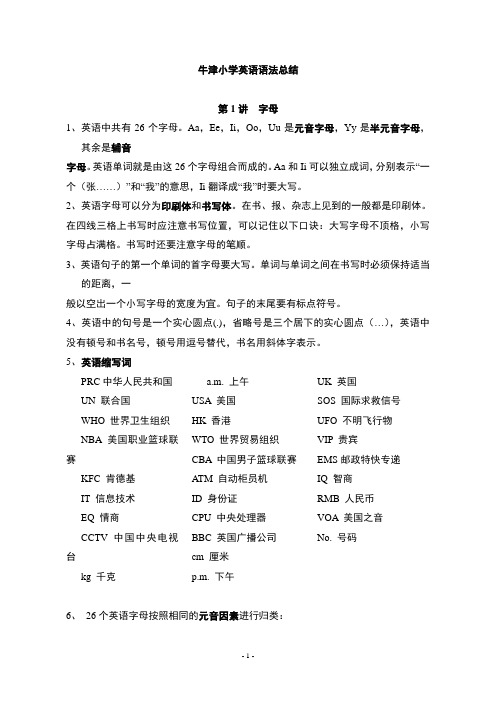
牛津小学英语语法总结第1讲字母1、英语中共有26个字母。
Aa,Ee,Ii,Oo,Uu是元音字母,Yy是半元音字母,其余是辅音字母。
英语单词就是由这26个字母组合而成的。
Aa和Ii可以独立成词,分别表示“一个(张……)”和“我”的意思,Ii翻译成“我”时要大写。
2、英语字母可以分为印刷体和书写体。
在书、报、杂志上见到的一般都是印刷体。
在四线三格上书写时应注意书写位置,可以记住以下口诀:大写字母不顶格,小写字母占满格。
书写时还要注意字母的笔顺。
3、英语句子的第一个单词的首字母要大写。
单词与单词之间在书写时必须保持适当的距离,一般以空出一个小写字母的宽度为宜。
句子的末尾要有标点符号。
4、英语中的句号是一个实心圆点(.),省略号是三个居下的实心圆点(…),英语中没有顿号和书名号,顿号用逗号替代,书名用斜体字表示。
5、英语缩写词PRC中华人民共和国UN 联合国WHO 世界卫生组织NBA美国职业篮球联赛KFC 肯德基IT 信息技术EQ 情商CCTV 中国中央电视台kg 千克a.m. 上午USA 美国HK 香港WTO 世界贸易组织CBA 中国男子篮球联赛ATM 自动柜员机ID 身份证CPU 中央处理器BBC 英国广播公司cm 厘米p.m. 下午UK 英国SOS 国际求救信号UFO 不明飞行物VIP 贵宾EMS邮政特快专递IQ 智商RMB 人民币VOA 美国之音No. 号码6、26个英语字母按照相同的元音因素进行归类:第2讲语音1、音素:语音的最小单位。
英语中共有48个音素,其中元音音素20个,辅音音素28个。
2单元音发音时唇形和舌位不变;双元音发音时由一个元音向另一个 元音滑动,唇形和舌位有一个变化过程,且前重后轻,前长后短。
3、辅音:发音时气流受到阻碍。
辅音分为清辅音和浊辅音两类。
清辅音发音时声带不振动;浊辅音发音时声带振动。
4、音标:用来记录音素的符号。
为了避免与字母混淆,音标被放在斜括号/ /内。
5、英语中的一个字母或字母组合在不同的单词中发音可能是不一样的,而相同的 发音对应的字母或字母组合也可能不完全相同。
牛津实用英语语法2021
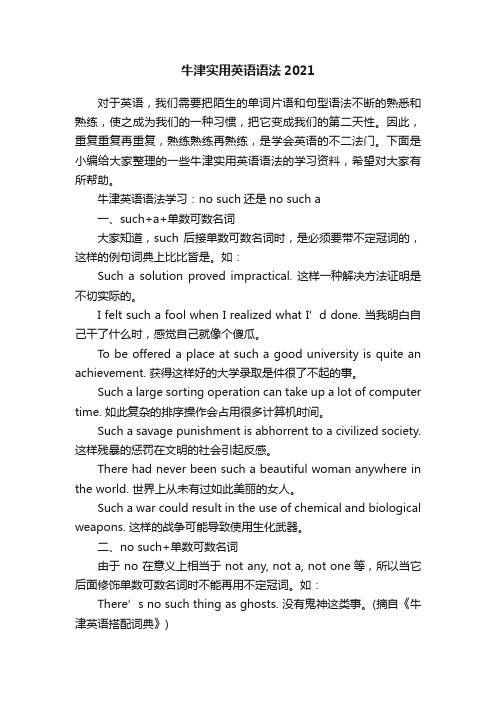
牛津实用英语语法2021对于英语,我们需要把陌生的单词片语和句型语法不断的熟悉和熟练,使之成为我们的一种习惯,把它变成我们的第二天性。
因此,重复重复再重复,熟练熟练再熟练,是学会英语的不二法门。
下面是小编给大家整理的一些牛津实用英语语法的学习资料,希望对大家有所帮助。
牛津英语语法学习:no such还是no such a一、such+a+单数可数名词大家知道,such 后接单数可数名词时,是必须要带不定冠词的,这样的例句词典上比比皆是。
如:Such a solution proved impractical. 这样一种解决方法证明是不切实际的。
I felt such a fool when I realized what I’d done. 当我明白自己干了什么时,感觉自己就像个傻瓜。
To be offered a place at such a good university is quite an achievement. 获得这样好的大学录取是件很了不起的事。
Such a large sorting operation can take up a lot of computer time. 如此复杂的排序操作会占用很多计算机时间。
Such a savage punishment is abhorrent to a civilized society. 这样残暴的惩罚在文明的社会引起反感。
There had never been such a beautiful woman anywhere in the world. 世界上从未有过如此美丽的女人。
Such a war could result in the use of chemical and biological weapons. 这样的战争可能导致使用生化武器。
二、no such+单数可数名词由于 no 在意义上相当于 not any, not a, not one等,所以当它后面修饰单数可数名词时不能再用不定冠词。
牛津中小学英语语法汇编(教材版)(K12教育文档)

牛津中小学英语语法汇编(教材版)(word版可编辑修改)编辑整理:尊敬的读者朋友们:这里是精品文档编辑中心,本文档内容是由我和我的同事精心编辑整理后发布的,发布之前我们对文中内容进行仔细校对,但是难免会有疏漏的地方,但是任然希望(牛津中小学英语语法汇编(教材版)(word版可编辑修改))的内容能够给您的工作和学习带来便利。
同时也真诚的希望收到您的建议和反馈,这将是我们进步的源泉,前进的动力。
本文可编辑可修改,如果觉得对您有帮助请收藏以便随时查阅,最后祝您生活愉快业绩进步,以下为牛津中小学英语语法汇编(教材版)(word版可编辑修改)的全部内容。
目录第一部分小学1A—6B语法汇编 (4)第一节可数名词与不可数名词 (4)第二节名词所有格 (7)第三节定冠词 (8)第四节并列连词 (10)第五节介词 (11)第六节时态 (13)第七节一般疑问句 (19)第八节特殊疑问句 (21)第九节 Like的用法 (23)第十节形容词的比较级和最高级 (24)第十一节情态动词 (29)第十二节时间表达法 (31)第十三节需要掌握知识点 (33)第二部分牛津英语7A—7B语法汇编 (35)第一节 7A特殊疑问句 (35)第二节 7A不定冠词的用法 (39)第三节 7A一般现在时 (39)第四节 7A频度副词 (41)第五节 7A名词的分类 (41)第六节 7A there be 句型的用法 (43)第七节 7A形容词的用法 (44)第八节 7A一般将来时 (45)第九节7A if条件状语从句 (46)第十节 7A一般过去时 (46)第十一节 7A人称代词 (47)第十二节 7A物主代词 (48)第十三节 7B顺序副词 (48)第十四节7B情态动词的用法 (49)第十五节 7B形容词的比较级 (51)第十六节 7B掌握序数词的变化及其用法 (53)第十七节 7B一般疑问句 (54)第十八节 7B连词and, so,but的用法 (56)第十九节 7B much、more与most的用法 (59)第三部分牛津英语8A-8B语法汇编 (60)第一节 8A祈使句 (60)第二节 8A数字加减乘除常用表示法 (61)第三节8A指示代词this, that, these, those的用法 (61)第四节 8A现在进行时 (62)第四节 8B现在完成时的重点和难点 (63)第五节 8B被动语态“三步曲” (68)第六节 8B直接引语变间接引语 (71)牛津英语9A—9B语法汇编 (75)第一节 9A接动词不定式的动词 (75)第二节9A接动名词的动词 (75)第三节 9A现在完成时 (75)第四节 9A被动语态 (76)第五节 9B过去进行时的用法 (76)第六节 9B 定于从句的用法 (76)第七节 9B When 和while 的用法 (83)第一部分小学1A-6B语法汇编第一节可数名词与不可数名词一、可数名词可数名词有单数和复数两种形式。
牛津实用英语语法1-4

28 副词的类别
形式与用法
29 由 ly 构成的副词
30 词形相同的副词与形容词
31 比较级与最高级
32 far , farther/farthest 和 further/furthest 的用法
33 much , more , most
96 介词与形容词、分词连用
97 动词和介词
98 介词后的动名词
99 介词/副词
第十章 动词概说
100 动词的分类
普通动词
101 主动态动词的主要变化
102 主动语态形式一览表
103 各种时态的否定形式
104 表示疑问和请求的疑问式
47 both
48 all/both/each+of 和其他可以替代的结构
49 neither , either
50 some , any , no 和 none (形容词和代词)
51 someone , somebody , something , anyone , anybody , anything , noone , nobody , nothing
61 ever 位于 who , what , where , why , when , how 之后
第七章 所有格代词、人称代词及反身代词 my , mine , I , myself 等
62 所有格形容词及所有格代词
63 所有格形容词的一致关系及用法
64 所有格代词用来代替所有格形容词+名词
52 else 位于 someone/anybody/nothing 等之后
53 another , other , others 与 one 和 some 连用
牛津实用英语语法(无乱码)第23章
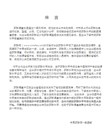
你最好什么也不说。(参见第120节。)
C 一般不宜在to与动词之间置入别的字;但有时有人这样用,见第248节分裂不定式。
D 为了避免重复,有时不定式的to可代替整个不定式:
— Do you smoke?
—No,but I used to(smoke).
take the trouble
turn out*(=prove to be)
* 参见D。
C A和B的例句
She agreed to pay £ 50.
她同意付50英镑。
Two men failed to return from the expedition.
探险队有两个人未能返回。
他会感觉到交朋友困难。
有时think也可这样用:
He thought it safer to go.
他认为去更安全一些。
在其他动词之后仍以不省略be为好。(关于类似的动名词结构,参见第258节。)
G 不定式的完成式也可作句子的主语:
To have made the same mistake twice was unforgivable.
to have done
定式的完成进行式:to have been working
to have been doing
不定式的现在式的被动形式:to be done
不定式的完成式的被动形式:to have been done
B 不定式的整个形式包括两个字:to+动词,如上所示;但在一些特定的动词和表达方法之后用不带to的不定式形式(参见第246节):
agree** be determined** pretend*
牛津实用英语语法大全(经典完整版)

第一章冠词和one,a little/a few,this,that1 a/an(不定冠词)a用在以辅音字母开头,或以读做辅音的元音字母开头的单词前面:a man一个男人 a university一所大学a hat一顶帽子 a European一个欧洲人a one-way street一条单行马路an用在以元音字母(a,e,i,o,u)开头,或以不发音的h字母开头的单词前面:an apple一个苹果an island一个岛an uncle一位大叔an onion一个洋葱an egg一个鸡蛋an hour一小时an还用在发音以元音开头的单个字母前面:an L-plate一块“实习驾驶”车牌an MP一个国会议员an SOS一个呼救信号an‘x’一个x字母、X形的东西或未知数a/an没有性的变化:a man一个男人a woman一个女人an actor一个男演员an actress一个女演员a table一张桌子2 a/an的用法A 用在第一次提到而非特指某人或某物的单数可数名词前面:I need a visa.我需要签证。
They live in a flat.他们住一个套间。
He bought an ice-cream.他买了一个冰淇淋。
B 用在代表一类东西的单数可数名词前面:A car must be insured汽车必须投保。
相当于:All cars/Any car must be insured.所有汽车/任何汽车都必须投保。
A child needs love.孩子需要爱。
相当于:All children need/Any child needs love.所有孩子/任何孩子都需要爱。
C 用在作表语的名词(包括职业名称)前面:It was an earthquake.是一次地震。
She’ll be a dancer.她将成为舞蹈演员。
He is an actor.他是演员。
D 用在某些表示数量的词组中:a lot of许多 a couple一对a great many很多a dozen一打(但也可以用one dozen)a great deal of大量E 用在某些数字前面:a hundred一百a thousand一千(参见第349节。
2018牛津高中英语语法大全集(1至模块10语法)(K12教育文档)

(完整word)2018牛津高中英语语法大全集(1至模块10语法)(word版可编辑修改)编辑整理:尊敬的读者朋友们:这里是精品文档编辑中心,本文档内容是由我和我的同事精心编辑整理后发布的,发布之前我们对文中内容进行仔细校对,但是难免会有疏漏的地方,但是任然希望((完整word)2018牛津高中英语语法大全集(1至模块10语法)(word版可编辑修改))的内容能够给您的工作和学习带来便利。
同时也真诚的希望收到您的建议和反馈,这将是我们进步的源泉,前进的动力。
本文可编辑可修改,如果觉得对您有帮助请收藏以便随时查阅,最后祝您生活愉快业绩进步,以下为(完整word)2018牛津高中英语语法大全集(1至模块10语法)(word版可编辑修改)的全部内容。
2018高考牛津高中英语-模块一至模块十语法牛津高中英语-模块一第一单元一定语从句:定语从句的介绍•就像是一个形容词或介词短语修饰名词一样,定语从句也可以修饰名词.定语从句所修饰的名词称为先行词.形容词:The green team介词短语:The team in green定语从句:The team who were wearing green•定语从句通常由关系代词来引导,如which, that, who, whom, whose,或关系副词来引导,如when, where, why。
关系代词可以在定语从句中担当主语,宾语,表语,定语;关系副词可以在定语从句中担当状语。
如:做主语The trees which are on the school campus have lost their leaves。
做宾语The student whom we saw just now is the best runner in our school.做表语Jack is no longer the lazy boy that he used to be.做定语She has a brother whose name I can’t remember.做状语The school where he studied is in Shenzhen。
2018牛津高中英语语法大全集(1至模块10语法)[1]
![2018牛津高中英语语法大全集(1至模块10语法)[1]](https://img.taocdn.com/s3/m/962979297c1cfad6185fa7a4.png)
(直打版)2018牛津高中英语语法大全集(1至模块10语法)(word版可编辑修改)编辑整理:尊敬的读者朋友们:这里是精品文档编辑中心,本文档内容是由我和我的同事精心编辑整理后发布的,发布之前我们对文中内容进行仔细校对,但是难免会有疏漏的地方,但是任然希望((直打版)2018牛津高中英语语法大全集(1至模块10语法)(word版可编辑修改))的内容能够给您的工作和学习带来便利。
同时也真诚的希望收到您的建议和反馈,这将是我们进步的源泉,前进的动力。
本文可编辑可修改,如果觉得对您有帮助请收藏以便随时查阅,最后祝您生活愉快业绩进步,以下为(直打版)2018牛津高中英语语法大全集(1至模块10语法)(word版可编辑修改)的全部内容。
2018高考牛津高中英语-模块一至模块十语法牛津高中英语-模块一第一单元一定语从句:定语从句的介绍•就像是一个形容词或介词短语修饰名词一样,定语从句也可以修饰名词。
定语从句所修饰的名词称为先行词。
形容词:The green team介词短语:The team in green定语从句:The team who were wearing green•定语从句通常由关系代词来引导,如which, that, who, whom, whose,或关系副词来引导,如when, where, why.关系代词可以在定语从句中担当主语,宾语,表语,定语;关系副词可以在定语从句中担当状语。
如:做主语The trees which are on the school campus have lost their leaves。
做宾语The student whom we saw just now is the best runner in our school。
做表语Jack is no longer the lazy boy that he used to be。
做定语She has a brother whose name I can’t remember。
- 1、下载文档前请自行甄别文档内容的完整性,平台不提供额外的编辑、内容补充、找答案等附加服务。
- 2、"仅部分预览"的文档,不可在线预览部分如存在完整性等问题,可反馈申请退款(可完整预览的文档不适用该条件!)。
- 3、如文档侵犯您的权益,请联系客服反馈,我们会尽快为您处理(人工客服工作时间:9:00-18:30)。
第二十三章不定式238 形式A 动词不定式各种形式的举例不定式的现在式: to work, to do不定式的现在进行式:to be workingto be doing不定式的完成式: to have worked,to have done定式的完成进行式:to have been workingto have been doing不定式的现在式的被动形式:to be done不定式的完成式的被动形式:to have been doneB 不定式的整个形式包括两个字:to+动词,如上所示;但在一些特定的动词和表达方法之后用不带to的不定式形式(参见第246节):You had better say nothing.你最好什么也不说。
(参见第120节。
)C 一般不宜在to与动词之间置入别的字;但有时有人这样用,见第248节分裂不定式。
D 为了避免重复,有时不定式的to可代替整个不定式:— Do you smoke?—No,but I used to(smoke).—你吸烟吗?—不,但我以前吸烟。
(参见第247节。
)239 用法A 不定式可以单独使用,如 We began to walk(我们开始走了);或作为不定式短语的一部分,如 We began to walk down the road(我们开始沿路步行)。
B 不定式可作句子的主语。
(参见第240节。
)C 不定式可作表语:His plan is to keep the affair secret.他的计划是将这件事保密。
D 不定式可作动词的宾语或宾语的一部分,直接跟在动词之后:He wants to pay(他想要付钱)。
(参见第241节与第243节。
)或跟在动词+ how, what等结构之后。
(参见第242节。
)或跟在动词+宾语之后: He wants me to pay(他想要我付钱)。
(参见第243节与第244节。
)E be+不定式可表示命令或指示。
(参见第114节。
)F 不定式可表示目的。
(参见第334节。
)G 不定式可用于某些形容词之后:angry glad happy sorry(参见第26节。
)fortunate likely lucky(参见第27节。
)H 不定式可连接从句。
(参见第249节。
)I 不定式有时可代替关系从句。
(参见第77节与第250节。
)J 不定式可用于某些名词之后。
(参见第251节。
)K 不定式可与too/enough以及某些特定的形容词/副词连用。
(参见第252节。
)L 某些不定式短语如 to tell the truth, to cut a long story short等可置于句首或句末。
(参见第253节。
)240 作主语A 不定式或不定式短语可作动词appear,be,seem的主语,这时不定式可位于句首:To compromise appears advisable.看来以妥协为好。
To lean out of the window is dangerous.身探出窗外很危险。
To save money now seems impossible.现在好像不可能存钱。
B 但更经常的做法是将代词it置于句首,而将不定式或不定式短语移至句末:It appears advisable to compromise.It is dangerous to lean out of the window.It seemed impossible to save money.在这里的it称为先行主语。
注意它在疑问句中使用的情况:Would it be safe to camp here?在这里宿营安全吗?Wouldn’t it be better to go on?继续走下去不是更好吗?这里必须用 it结构,否则会产生 Would+to camp和Wouldn’t+to go on那样的语序,而那样是不可以的。
C 通常这一类不定式结构由 it+be+形容词+不定式组成。
(参见第26节与第27节。
)但有时也可用名词代替形容词:It would be a crime/a mistake/a pity to cut down any more trees.再砍伐树木将是一种犯罪/是一个错误/是个遗憾。
It is an offence to drop litter in the street.在马路上乱丢废物是违章的。
D cost/take+宾语+不定式(主语)也是可行的:It would cost millions/take years to rebuild the castle.重建这座城堡需要花数百万元/许多年的时间。
E 从一般的角度考虑一种动作时,可用动名词而不用不定式,但用不定式更为保险。
但我们想要指特定的一次时,必须用不定式:He said,‘Do come.’It was impossible to refuse.他说:“一定来。
”不可能拒绝他的要求。
但是说:It is not always easy to refuse invitations.别人的邀请往往无法轻易拒绝。
It is not always easy to refuse invitations可以用 Refusing invi- tations is not always easy来代替。
在这里这一动作是从一般的角度考虑的,所以动名词和不定式都可以。
(另参见第258节。
)F it+不定式结构可位于 believe/consider/discover/expect/ find/think(that)和wonder(if)之后:He thought(that) it would be safer to go by train.他认为乘火车去较安全。
这样用的 find之后可省略 that+动词 be:He found(that) it was easy to earn extra money./He found it easy to earn extra money.他发现赚点外快很容易。
He will find(that) it is hard to make friends./ He will find it hard to make friends.他会感觉到交朋友困难。
有时think也可这样用:He thought it safer to go.他认为去更安全一些。
在其他动词之后仍以不省略be为好。
(关于类似的动名词结构,参见第258节。
)G 不定式的完成式也可作句子的主语:To have made the same mistake twice was unforgivable.两次犯同样的错误是不可原谅的。
这里同样也可用it作为先行主语:It is better to have loved and lost than never to have loved at all.爱过而后失去了爱,比从未爱过要好。
241 作宾语和作表语A 后面直接跟动词不定式的动词agree** be determined** pretend*aimendeavourproceedappear*failpromise*arrange**forget*prove*ask** guarantee* refuseattempt happen* remember*bother(否定)hesitateresolve**care(否定) hope seem*choose learn *swear*claim** longtendcondescendmanage threaten*consentneglecttrouble(否定)decide** offer try(=attempt)decline planundertake*demand** preparevolunteerdetermine**be preparedvow*参见D。
**参见F。
助动词bedarehavemust oughtwillcando mayneedzhall used(关于动词后接宾语+不定式,参见第244节。
关于动词后接不定式或动名词,参见第二十五章。
)B 后面也可接不定式的短语be aboutbe able+afforddo one’s best/do what one canmake an/every effortmake up one’s mind*(=decide)it+occur*+to+宾语(否定式或疑问式)set outtake the troubleturn out*(=prove to be)*参见D。
C A和B的例句She agreed to pay £ 50.她同意付50英镑。
Two men failed to return from the expedition.探险队有两个人未能返回。
I managed to put the fire out.我好歹把火扑灭了。
They are preparing(= getting ready) to evacuate the area.他们正准备从这一地区撤离。
We are not prepared(=willing) to wait any longer.我们不准备再等了。
The tenants refused to leave.房客拒绝搬出。
Prices always tend to go up.物价总是趋于上涨。
She volunteered to help with Meals on Wheels.她自愿帮助给老、弱、病、残送饭上门。
He is just about to leave.他正要离开。
(参见第114节C。
)We can’t afford to live in the centre.在市中心生活,费用我们负担不起。
He didn’ t bother/trouble to answer personally.他嫌麻烦不愿亲自回答。
与上面相反的例子:He took the trouble to answer personally.他不嫌麻烦亲自回答。
D 上面标有星号的词或短语也可以与that从句连用(参见第346节):I promise to wait.相当于:I promise that I will wait.我答应等候。
He pretended to be angry.相当于:He pretended that he was angry.他假装生气。
occur to+宾语+ that用于肯定式、否定式和疑问式。
注意这个结构跟occur+不定式在意义上的区别:It didn’t occur to me to ask him for proof of his identity.我没有想到向他要身份证明。
